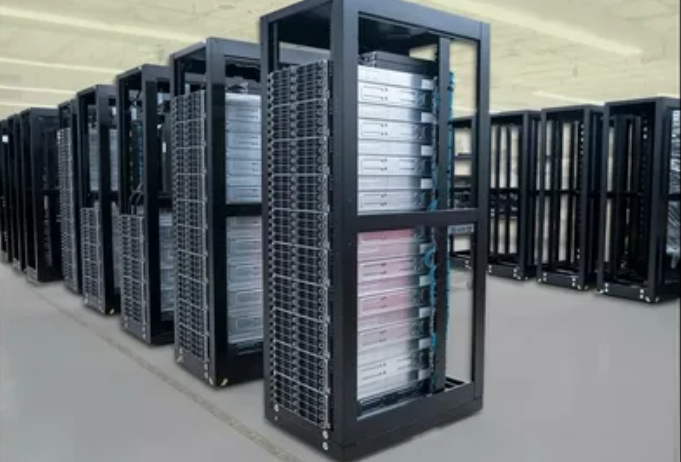As technological progress persists, rack servers persistently maintain their prominent role, functioning as the foundational infrastructure within modern data centres. They steadfastly bolster the continually escalating requisites for computational capacity and data storage. The pivotal role played by rack servers in enhancing operational efficiency, safeguarding data integrity, and fostering adaptability is of paramount importance.
Let us discuss the power of rack servers for supercharging your operations by diving deep in this blog.
Effectively Allocate Workloads
Resource Allocation:
Rack servers possess multiple CPU sockets, RAM slots, and storage bays within their modular framework, affording IT administrators the capacity to customise the allocation of server resources in accordance with the distinct demands of varying workloads. Servers endowed with heightened CPU capabilities can be designated for high-computational tasks, while applications reliant on substantial storage capacity can capitalise on expanded storage resources.
Load Balancing:
These servers can be seamlessly integrated with load balancing software or hardware components to equitably distribute incoming network traffic across an array of servers. This not only serves to amplify system performance but also serves as a safeguard against any individual server emerging as a performance bottleneck.
Excel At Swiftly Handling Data
Rack servers are purposefully designed to exhibit remarkable computational prowess. Possessing multiple central processing units (CPUs) and memory modules, they exhibit the capacity to perform intricate numerical computations, and handle extensive datasets with remarkable celerity. This capability leads to a noteworthy reduction in latency and contributes to the seamless execution of data-related tasks. Servers come equipped with high-velocity network interfaces, facilitating expeditious data transmission between servers and storage arrays. This feature ensures that data traverses the network with alacrity and efficiency. Rack type servers frequently integrate support for virtualization technologies, affording organisations the opportunity to optimise resource utilisation.
Store and Access Data Effortlessly
In the continuously evolving realm of contemporary corporate endeavours, the capacity to effortlessly store and retrieve data stands as an indispensable element for achieving success. Rack servers assume a pivotal role in expediting this vital facet of organisational effectiveness. These resilient apparatuses serve as a centralised depository for your data, affording you the opportunity to amalgamate information from diverse origins and applications in a seamless manner. Given the escalating magnitude of digital data generation on a daily basis, servers furnish the capability to securely and conveniently warehouse substantial data volumes. Accessibility holds paramount importance in the present-day expeditious business milieu, and these servers demonstrate exceptional prowess in this aspect.
Provides Reliable Uptime
Rack type servers have been intentionally crafted with redundancy as a central design consideration. They frequently incorporate dual power supplies and components that can be replaced while the system is operational. These features collectively serve to mitigate the potential for downtime resulting from hardware failures. In the event of a component malfunction, the server system seamlessly transitions to a backup, thus ensuring uninterrupted continuity of operations. These servers are purposefully engineered to deliver a high degree of availability. They offer the capability to be configured with failover mechanisms and load balancing functionalities.
Easily Expand Your Server Capacity
Scalability:
Rack servers exhibit a modular architecture, facilitating the straightforward addition or removal of servers as necessary. This adaptability ensures that your infrastructure can expand smoothly in response to heightened workloads, surges in traffic, or evolving business prerequisites.
Cost-Efficiency:
The modular characteristics inherent to these servers also result in fiscal savings. Instead of investing in an entirely new server arrangement, you can effortlessly integrate supplementary rack units (RUs) as your requirements expand. This scalability diminishes initial capital outlays and contributes to the optimization of your IT budget.
Space Optimization:
These servers are engineered with a compact design, intended for vertical stacking within standardised server racks. This efficient utilisation of space empowers you to accommodate a greater computational capacity within a smaller physical footprint, rendering them an exemplary choice for businesses confronting spatial limitations within their data centre facilities.
Enhanced Cooling:
These servers are thoughtfully crafted with efficient cooling mechanisms, guaranteeing that as your server capacity expands, you encounter no overheating predicaments. This reduction in the likelihood of downtime and hardware malfunctions is consequential in maintaining operational stability.
Safeguards Your Data
Rack type servers are specifically engineered for installation within highly secure data centres. These protocols encompass elements such as biometric access control, and securely locked cabinets. Furthermore, data centres housing these servers are fortified with cutting-edge fire suppression systems engineered to swiftly identify and extinguish fires. Thereby minimising the risk of any harm befalling the servers or the invaluable data they store.
Facilitates Remote Management
Rack servers confer upon enterprises the advantage of facilitating remote management. Irrespective of geographical constraints, administrators possess the capability to remotely access and govern these servers via secure connections. This attribute assumes pronounced significance in the contemporary landscape, marked by the burgeoning prevalence of remote work arrangements and the dispersion of teams.
In A Nutshell
Rack servers occupy a central position within contemporary information technology infrastructure, assuming a crucial function in augmenting the effectiveness, scalability, and administrative facilitation of organisational operations. Their streamlined and standardised configuration permits efficient spatial utilisation within data centres, concurrently upholding their capacity for robust performance. Thereby enabling the expeditious execution of imperative operational functions.

